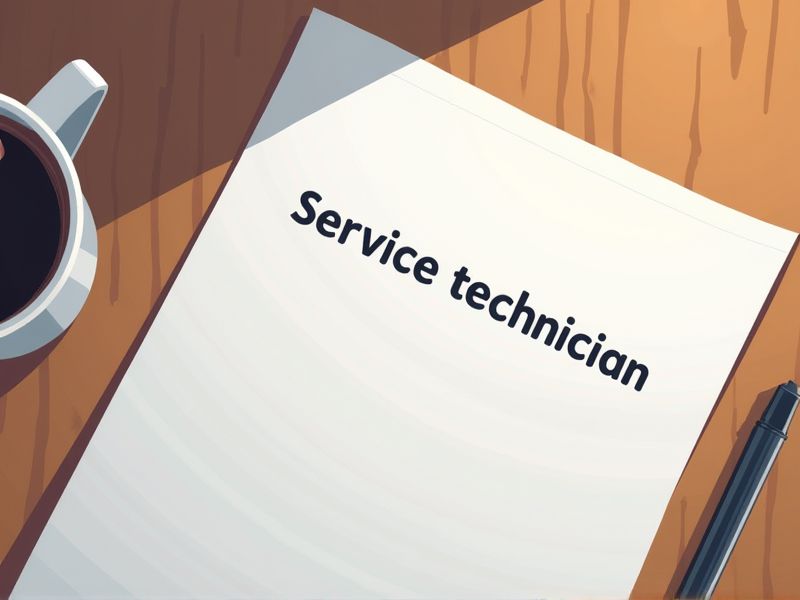
Service technicians work with complex machinery and systems, requiring specific knowledge and skills to maintain efficiency and safety standards. Certifications validate their expertise, ensuring they understand and comply with industry regulations and guidelines. These credentials often lead to increased job opportunities and credibility within the field. Here are some important certifications you may need as a service technician.
CompTIA A+
Service technicians often handle a variety of hardware and software issues, and CompTIA A+ provides foundational knowledge necessary to navigate these challenges effectively. Employers frequently look for CompTIA A+ certification as it validates a technician's understanding of essential IT tasks, increasing job prospects. The certification ensures technicians are equipped with troubleshooting skills that improve efficiency in diagnosing problems. As technology evolves, CompTIA A+ keeps technicians updated with the latest industry standards and practices.
CompTIA Network+
CompTIA Network+ provides foundational networking skills essential for troubleshooting and managing network systems, a critical aspect of a service technician's role. Service technicians often face complex networking problems, and Network+ certification equips them with the knowledge to diagnose and resolve such issues effectively. The certification covers a range of networking concepts, enabling technicians to work with different hardware and software systems confidently. With cybersecurity becoming increasingly important, Network+ also imparts essential security practices, helping technicians safeguard networks they are responsible for maintaining.
CompTIA Security+
Service technicians often handle sensitive data, and CompTIA Security+ equips them with essential knowledge to protect this information. Many organizations have regulatory compliance requirements, and having technicians certified in security demonstrates their commitment to adhering to these standards. As cyber threats increase, technicians with Security+ certification are better prepared to identify vulnerabilities and mitigate potential risks. Employers often prefer or require the certification as it validates technical skills and enhances the technician's credibility in the field.
Cisco Certified Network Associate (CCNA)
Obtaining the Cisco Certified Network Associate (CCNA) certification equips a service technician with essential networking knowledge and skills, which leads to enhanced problem-solving capabilities. This certification is recognized globally, increasing job opportunities as employers seek individuals who can effectively manage and support network infrastructures. Having a CCNA ensures that the technician stays updated with industry standards and technologies, facilitating efficient troubleshooting and network design. Employers often prioritize CCNA-certified technicians, resulting in potential career advancements and higher salary prospects.
Microsoft Certified: Modern Desktop Administrator Associate
Obtaining the Microsoft Certified: Modern Desktop Administrator Associate ensures technicians have verified skills to deploy, configure, and maintain Windows operating systems, which directly improves service delivery and customer satisfaction. Employers often require certifications to validate technical proficiency, leading to increased job opportunities and career advancement for service technicians. The certification equips technicians with the knowledge to effectively manage device security, updates, and applications, thereby decreasing system downtime and increasing operational efficiency. Certified technicians contribute to reduced operational costs by minimizing errors and optimizing existing IT resources.
Certified Electronics Technician (CET)
Employers often require the Certified Electronics Technician (CET) certification to ensure that service technicians possess standardized skills and knowledge in electronics. The certification validates technical proficiency, which can lead to improved customer trust and satisfaction. With the rapid evolution of electronic systems, having CET credentials helps technicians stay updated with current technologies and industry standards. The certification also serves as a competitive advantage in the job market, potentially leading to better job opportunities and career advancement.
HDI Support Center Analyst (HDI-SCA)
An HDI Support Center Analyst improves issue resolution times because they have specialized training in managing and prioritizing service requests efficiently. They enhance communication between service technicians and end users by effectively translating user concerns into technical requirements. By keeping accurate records of incidents and resolutions, the analyst provides critical data that helps technicians identify recurring problems. Continuous interaction with end users enables the analyst to gather feedback, driving service improvements and technician performance refinement.
EPA 608 Universal Certification
Service technicians require EPA 608 Universal Certification to legally handle and dispose of refrigerants, as mandated by the Clean Air Act. This certification ensures technicians are knowledgeable about environmental regulations, thereby reducing harmful emissions. It also enhances job prospects, as many employers prefer or mandate certified technicians. Noncompliance with certification requirements can lead to significant penalties and fines for both individuals and companies.
Lean Six Sigma Yellow Belt
Lean Six Sigma Yellow Belt certification provides service technicians with tools to enhance problem-solving skills. This approach results in improved process efficiencies, reducing service time and enhancing customer satisfaction. A better understanding of data-driven decision-making leads to more effective resource allocation. Streamlined operations contribute to a reduction in errors, boosting reliability and service quality.
IPC-A-610 Certification
Service technicians with IPC-A-610 certification possess validated knowledge regarding the acceptability standards for electronic assemblies, which potentially reduces errors in evaluating PCB quality. This expertise usually ensures that they can accurately assess and address quality concerns, minimizing costly rework or returns. Many companies that manufacture or service electronic equipment tend to require compliance with industry standards, which often necessitates technicians to have such certifications. Enhancing a technician's qualifications with this certification might increase employability and career opportunities within the electronics industry.
Summary
When you obtain certifications as a service technician, your credibility and trust with clients often increase, leading to more job opportunities. Certified technicians typically earn higher salaries due to their specialized skills. Employers also tend to favor certified technicians because they help improve service standards. The combination of increased trust, higher earnings, and job security enhances career growth.
